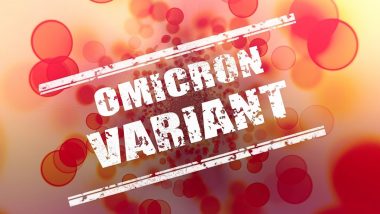Singapore, Dec 30: Experts in Singapore, where 170 new Omicron cases were reported on Wednesday, have warned that the new and supposedly more contagious variant is likely to replace Delta over the coming weeks to months.
While Delta is still the most common variant in all continents except Africa,
Omicron is spreading very quickly, said Dr Sebastian Maurer-Stroh, executive director of the state-owned Agency for Science, Technology and Research's Bioinformatics Institute here.
Also Read | Taiwan Reports Another Incursion As 5 Chinese Warplanes Enter Its Air Defence Zone.
Of the genome submissions sent to the Munich-headquartered Gisaid, a data science initiative that provides the shared genome platform for Covid, the Omicron strain has comprised between 7 per cent and 27 per cent of new submissions over the past month, up until Tuesday. The figures refer to all continents except Africa.
"From current data, it looks like Delta will go down over time relative to Omicron," The Straits Times said quoting Dr Maurer-Stroh, who is part of the global team that maintains Gisaid.
The new variant was first detected in South Africa on November 11, and then in Botswana and Hong Kong, before it rippled across more than 110 countries, as at last weekend.
Omicron is already dominant in Australia, India, Russia, South Africa and the United Kingdom, noted Professor Dale Fisher, a senior consultant at the National University Hospital's Division of Infectious Diseases.
"We are seeing a global transition from Delta to Omicron because with a greater transmissibility, the virus is fitter and has a reproductive advantage," noted Prof Fisher.
But he added a caveat that the reports of Omicron rates may be biased as some countries do little gene sequencing, and those that do may be looking for a deletion in a specific spike gene to identify Omicron, instead of carrying out whole genome sequencing.
Singapore's Ministry of Health (MOH) said on its website that from December 24, Covid-19 cases that tested positive for the so-called S-gene target failure will be categorised as Omicron.
The S-gene encodes the virus's spike protein. Based on local experience, if a person tests positive for the S-gene target failure, the individual is very likely to have the Omicron variant, said MoH, noting that this practice aligns with those in other countries.
Fisher said most experts in the field believe Omicron will replace Delta as the dominant strain.
A South Africa study suggested that Delta may be displaced because infection with the new variant boosts immunity to the older one, Reuters reported on Tuesday.
While the Delta variant has 13 mutations with nine on the spike protein, Omicron has about 50 mutations not seen together before, and 32 of them are on the spike protein.
Because of its mutations, the Delta variant attaches more effectively to human cell receptors, causing it to be more infective, said Fisher. But the Omicron variant made health authorities more concerned as the virus is even "stickier" because of its extra mutations, he added.
The rise and fall of new variants over time follows the laws of nature and the survival of the fittest, Fisher noted.
Dr Maurer-Stroh said the environment in which two variants compete will also help determine which is more successful.
"As immunity in the population increases from both vaccination and natural infection, severity goes down but even slightly better escape from the prevalent immune response can give one variant the extra edge over another," he said.
"This is also what we see with different flu variants every year." Dr Maurer-Stroh said, "Because of the great benefit of vaccination including boosters, we see less severe cases."
As Omicron and Delta continue to wrestle for dominance, some have wondered whether it would be possible to be infected with both strains at the same time.
"This is possible but rare. And very quickly, only one variant would be the dominant infection in the body," added Dr Maurer-Stroh.
International evidence indicates that the Omicron variant is likely to be more transmissible, but less severe than the Delta variant.
Meanwhile, local and foreign travellers entering Singapore are each allowed to bring with them a maximum of 20 Covid self-test kits as long as they are approved for use in the country the traveller is arriving from though not authorised for use here.
This has been the case since December 23, the Health Sciences Authority (HSA) told The Straits Times.
The HSA said it had observed an increase in personal imports of Covid self-test kits into Singapore since October.
It had barred the import of some of these test kits, which have not been evaluated for quality or efficacy, as they may be resold locally.
But with the reopening of borders, the HSA said it recognised the need for travellers to bring their own self-test kits to fulfil the necessary testing requirements here.
The HSA has authorised 11 Covid-19 self-test kits for use in Singapore. But members of the public are reminded that the import of self-test kits through parcel post is still not allowed.
Any onward supply by wholesale of self-test kits is also not permitted and will require licences and authorisation from HSA. Those infringing this can be imprisoned for up to two years and/or fined up to SGD50,000, if convicted, according to the report.
(This is an unedited and auto-generated story from Syndicated News feed, LatestLY Staff may not have modified or edited the content body)













 Quickly
Quickly

















